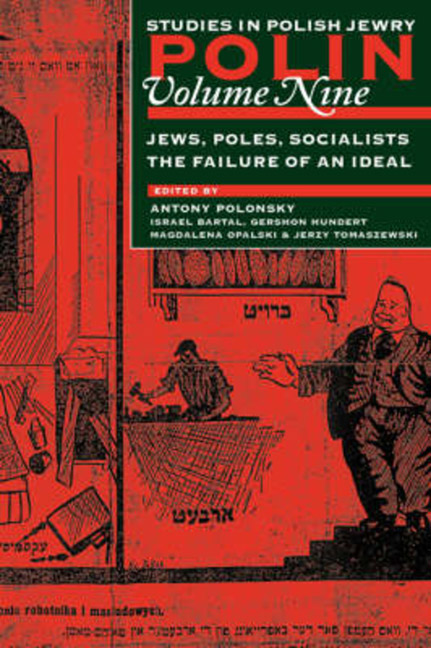Book contents
- Frontmatter
- Dedication
- Editors and Advisers
- Preface
- Acknowledgement
- Polin
- Polin: Studies in Polish Jewry
- Contents
- Note on Transliteration, Names, and Place Names
- Abbreviations
- Introduction
- PART I POLES, JEWS, SOCIALISTS: THE FAILURE OF AN IDEAL
- PART II NEW VIEWS
- PART III REVIEWS
- REVIEW ESSAYS
- BOOK REVIEWS
- Alfred Ebenbauer and Klaus Zatloukal (eds.), Die Juden in ihrer mittelalterlichen Umwelt
- Rivka Schatz-Uffenheimer, Hasidism as Mysticism
- Jadwiga Maurer, ‘Z matki obcej … ’
- Władyslaw T. Bartoszewski and Antony Polonsky (eds.), The Jews in Warsaw
- Maria Klańska, Problemfeld Galizien in deutschsprachiger Prosa 1846-191
- Israel Oppenheim, Tenuat Heḥaluts bePolin, 1929-1939
- The Letters of Martin Duber, ed. Nahum N. Glatzer and Paul Mendes-Flohr
- Alexander Heider, A Dictionary of Jewish Surnames from the Russian Empire
- Alice L. Eckardt (ed.), Burning Memory
- Ruta Sakowska, Ludzie z dzielnicy zamkniętej
- lwona Irwin-Zarecka, Neutralizing Memory
- Stanislaw Meducki and Zenon Wrona (eds.), Antyzydowskie wydarzenia kieleckie, 4 lipca 1946
- Bibliography Of Polish-Jewish Studies, 1993
- Notes on Contributors
- Notes on Translators
- Glossary
- Index
The Letters of Martin Duber, ed. Nahum N. Glatzer and Paul Mendes-Flohr
from BOOK REVIEWS
- Frontmatter
- Dedication
- Editors and Advisers
- Preface
- Acknowledgement
- Polin
- Polin: Studies in Polish Jewry
- Contents
- Note on Transliteration, Names, and Place Names
- Abbreviations
- Introduction
- PART I POLES, JEWS, SOCIALISTS: THE FAILURE OF AN IDEAL
- PART II NEW VIEWS
- PART III REVIEWS
- REVIEW ESSAYS
- BOOK REVIEWS
- Alfred Ebenbauer and Klaus Zatloukal (eds.), Die Juden in ihrer mittelalterlichen Umwelt
- Rivka Schatz-Uffenheimer, Hasidism as Mysticism
- Jadwiga Maurer, ‘Z matki obcej … ’
- Władyslaw T. Bartoszewski and Antony Polonsky (eds.), The Jews in Warsaw
- Maria Klańska, Problemfeld Galizien in deutschsprachiger Prosa 1846-191
- Israel Oppenheim, Tenuat Heḥaluts bePolin, 1929-1939
- The Letters of Martin Duber, ed. Nahum N. Glatzer and Paul Mendes-Flohr
- Alexander Heider, A Dictionary of Jewish Surnames from the Russian Empire
- Alice L. Eckardt (ed.), Burning Memory
- Ruta Sakowska, Ludzie z dzielnicy zamkniętej
- lwona Irwin-Zarecka, Neutralizing Memory
- Stanislaw Meducki and Zenon Wrona (eds.), Antyzydowskie wydarzenia kieleckie, 4 lipca 1946
- Bibliography Of Polish-Jewish Studies, 1993
- Notes on Contributors
- Notes on Translators
- Glossary
- Index
Summary
The Letters of Martin Duber is an important and extremely well executed text, based upon the three-volume German edition of 1975. It includes a fine 62-page biographical sketch by Grete Schaeder that reviews the major persons and developments in Buber's life, extensive notes to the individual letters of Buber and his correspondents by Mendes-Flohr, a descriptive list of correspondents, photographs, and an index. In all, the editors provide all the requisite resources to enable the reader to plumb the depths of this valuable cache.
What might we hope to find in turning to the letters of a man who is famous for his philosophic writings about the redemptive quality of relationship? We might hope to encounter exchanges that are not mere correspondence, to uncover insights into the ways in which individuals struggle together with matters of ultimate concern. The letters do not only succeed in providing such moments and insights, but they also corroborate Buber's understanding that the most elevated events of ‘the between’ are transient. The letters attest to what Ernst Simon described as Buber's ‘sense of “responsibility for the word“’ (p. xii). However, in the light of the heavy volume of daily correspondence Buber faced, one must admire his honest admission that he is surprised when a ‘real letter’ issues from his pen (p. 288).
Paradoxically, the text gives evidence of Huber's ambivalence concerning the writing of letters. In addition to being demanding work, Buber and many of those who corresponded with him believed that writing was an inadequate substitute for speaking face to face (p. 269). In the letters there are an impressive number of allusions to how powerful such personal encounters with him really were (p. 606). Letters were also problematic for Buber because, even in the context of a dialogue, he valued most highly the silent exchange of glances between persons (p. 288; see also his essay ‘Dialogue’).
The letters vividly illuminate the most important relationships in his life, those with his wife Paula Winkler, Florens Christian Rang, Gustav Landauer, Franz Rosenzweig, and Ernst Simon. All of these were begun before Buber was 40, and they played decisive roles in the development of his life and thought. With the early deaths of Rang, Landauer, and Rosenzweig, Buber experienced grave personal and intellectual losses.
- Type
- Chapter
- Information
- Jews, Poles, Socialists: The Failure of an Ideal , pp. 286 - 288Publisher: Liverpool University PressPrint publication year: 2008

